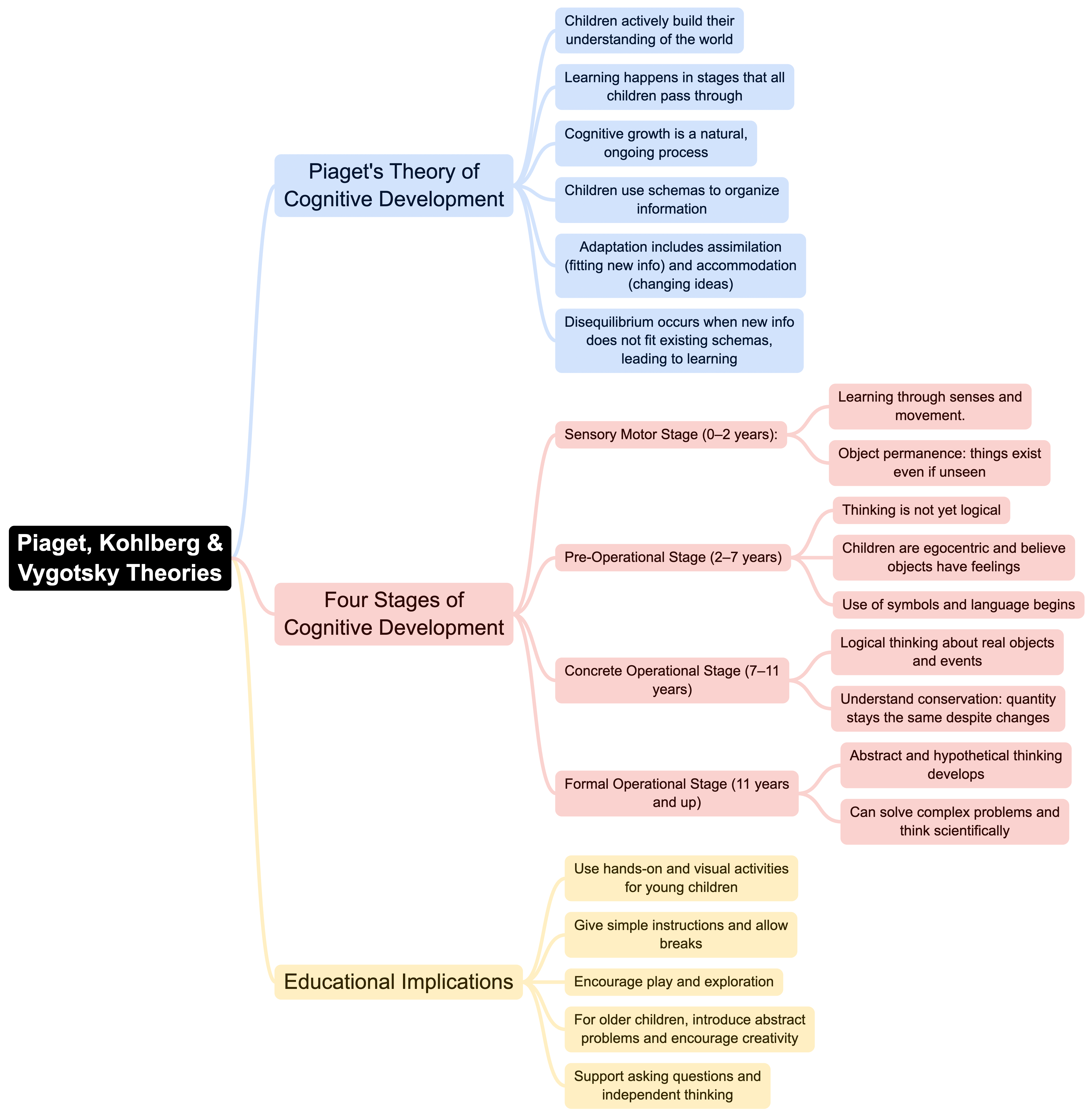CTET & State TET Exam > CTET & State TET Notes > Child Development and Pedagogy for CTET Preparation > Mind Map: Piaget, Kohlberg & Vygotsky Theories
Mind Map: Piaget, Kohlberg & Vygotsky Theories | Child Development and Pedagogy for CTET Preparation - CTET & State TET PDF Download

The document Mind Map: Piaget, Kohlberg & Vygotsky Theories | Child Development and Pedagogy for CTET Preparation - CTET & State TET is a part of the CTET & State TET Course Child Development and Pedagogy for CTET Preparation.
All you need of CTET & State TET at this link: CTET & State TET
|
67 videos|154 docs|41 tests
|
FAQs on Mind Map: Piaget, Kohlberg & Vygotsky Theories - Child Development and Pedagogy for CTET Preparation - CTET & State TET
| 1. What are the main stages of cognitive development according to Piaget? |  |
Ans.Piaget's theory outlines four main stages of cognitive development: the Sensorimotor stage (birth to 2 years), where infants learn through sensory experiences and actions; the Preoperational stage (2 to 7 years), characterized by symbolic thinking and egocentrism; the Concrete Operational stage (7 to 11 years), where children begin to think logically about concrete events; and the Formal Operational stage (11 years and up), where abstract reasoning and problem-solving skills develop.
| 2. How does Kohlberg's theory of moral development differ from Piaget's cognitive development theory? |  |
Ans.Kohlberg's theory of moral development builds on Piaget's work by focusing specifically on how individuals develop moral reasoning. While Piaget identified cognitive stages, Kohlberg proposed three levels of moral reasoning: Pre-conventional, where moral judgments are based on personal consequences; Conventional, where societal norms and laws are considered; and Post-conventional, where moral principles are based on universal ethical standards. This distinction emphasizes moral growth as a separate aspect from cognitive development.
| 3. What role does Vygotsky's concept of the Zone of Proximal Development (ZPD) play in learning? |  |
Ans.Vygotsky's Zone of Proximal Development (ZPD) refers to the range of tasks that a learner can perform with guidance but not yet independently. This concept highlights the importance of social interaction and scaffolding in learning. Educators can use the ZPD to tailor their instruction, providing support that helps students progress to higher levels of understanding and competence.
| 4. How do Piaget, Kohlberg, and Vygotsky's theories complement each other in understanding child development? |  |
Ans.Piaget, Kohlberg, and Vygotsky each offer unique perspectives that together provide a more comprehensive understanding of child development. Piaget focuses on cognitive stages, Kohlberg emphasizes moral reasoning, and Vygotsky highlights the social context of learning. Together, they illustrate the multifaceted nature of development, showing how cognitive abilities, moral understanding, and social interactions all contribute to a child's growth.
| 5. What are some criticisms of Piaget, Kohlberg, and Vygotsky's theories? |  |
Ans.Critics of Piaget argue that his stages may not be as rigid as proposed and that children can demonstrate abilities outside the suggested age ranges. Kohlberg's theory has been criticized for its Western cultural bias and for not adequately addressing the role of emotion in moral reasoning. Vygotsky's emphasis on social interaction may overlook individual differences in cognitive development. Despite these criticisms, their theories remain influential in educational psychology.
Related Searches
















